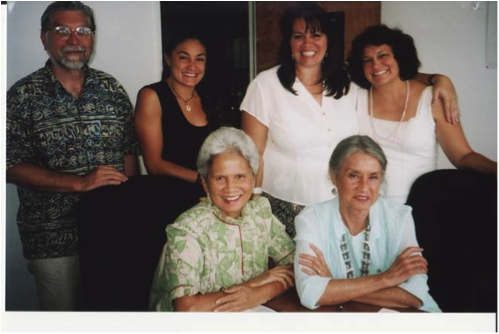This course seeks to grow our own healers in beautiful Nānākuli, which has one of the highest concentrations of Native Hawaiians in the world. MS1s spend time getting to know each other then tap into their creativity to educate Nānākuli teens on health and higher education. What we actually end up learning from these teens (resilience, aloha, and hope) is far greater than what we give.Nā ʻŌpio collaborates with Kuaola to do monthly Saturday activities at Oahu cultural sites, UH sports events, and/or homeless villages. As an MS1, expect to learn about: Native Hawaiian culture and health, wellness and self-reflection, teaching skills and rural health. Nā ʻŌpio O Nānākuli seeks incoming MS1s from all walks of life!
Please contact Sachi Kaulukukui for more info at sachi@hawaii.edu
This multidimensional course exposes students to Native Hawaiian Health: Past, Present and Future, utilizing a combination of didactics, hands-on workshops, and field trips to connect the past with the present while looking towards the future. The goal is to produce medical students that can approach health and wellness holistically with their patients.
Past: Students study traditional healing practices and the importance of the Native Hawaiian relationship to the land and environmental resources, with respect to health.
Present: The current status of Native Hawaiian health, including health disparities, is examined through didactics, literature reviews and field trips to community agencies with innovative programs to improve Native Hawaiian health.
Future: The future of Native Hawaiian health, specifically decreasing health disparities, is explored by learning about current research being conducted in Native Hawaiian communities and the translation of this research into practice.
For more information contact Dr. Martina Kamaka at martinak@hawaii.edu.
During each year of the grant cycle, NHCOE builds a competitive applicant pool through two programs developed to specifically address the needs of Native Hawaiian students.
The Native Hawaiian Student Pathway to Medicine Program (NHSPM) and the Native Hawaiian Interdisciplinary Health Program (NHIH) provides Native Hawaiian undergraduate and post-graduate students with workshops, individualized academic and career guidance, peer support, and access to a mentoring network. Cultural competency is an integral component of these programs.
View more about these programs here.
Cultural competency efforts supported by NHCOE are led by the C3 (cultural competency curriculum development) team comprised of faculty members of the Department of Native Hawaiian Health, Department of Family Medicine, the School of Social Work, and community members.

The C3 integrates national guidelines for cultural competency training paired with results from our own focus group research to deliver innovative teaching methodologies to medical students and residents utilizing Native Hawaiian health as the focus of activities.
Topics covered by the various activities include: defining cultural competency, self-awareness exercises, NH health disparities (with an emphasis on its relationship to Hawaiʻi history), cultural trauma and indigenous healing, Native Hawaiian traditional healing, cultural resources in the community, patient-physician interaction (including establishing rapport, role of the culture of Western medicine), NH cultural practices and values and their role in patient treatment/resource utilization and current research related topics in NH health. Other efforts are focusing on developing collaborative relationships with other indigenous medical programs, assessment strategies and new teaching strategies.
The Kuaola program works with first-year medical students who thrive to inspire and mentor students at Nānākuli High and Intermediate school. Our students promote healthy living and disease prevention. The goal is to provide a "big picture" of health and begin to understand the social determinants of health that affect adolescents, their families, and the community in which they live. Unique to this program is the diverse monthly service-learning cultural field trips, clinical shadowing opportunities at the Waianae Coast Comprehensive Health Center, longitudinal mentor-mentee relationship, and school-based teaching modules that inspire students to become passionate about their health and academic success. The Kuaola program works closely with Nā ʻŌpio O Nānākuli medical students to improve the health and wellness of West Oahu children and their families. We welcome all MS1's who thrive to inspire, lead, and mentor middle and high school students to be the best versions of themselves.
Please feel free to contact Dr. Kelli-Ann Frank Voloch at voloch@hawaii.edu for more information.
Below are articles published by NHCOE faculty staff, along with professional colleagues. This list is not comprehensive, but rather recent articles published from 2010-2017.
Listed below are published books, book chapters and other scholarly works by NHCOE faculty and staff, along with professional colleagues.